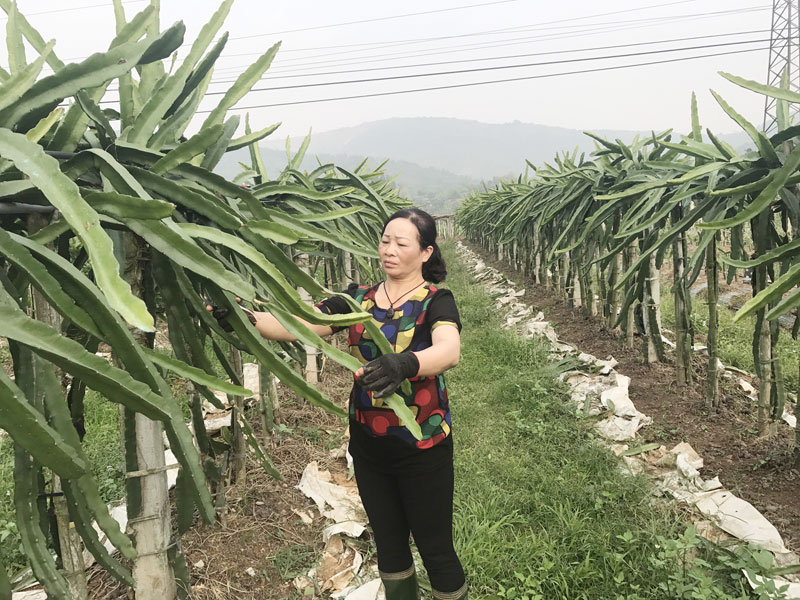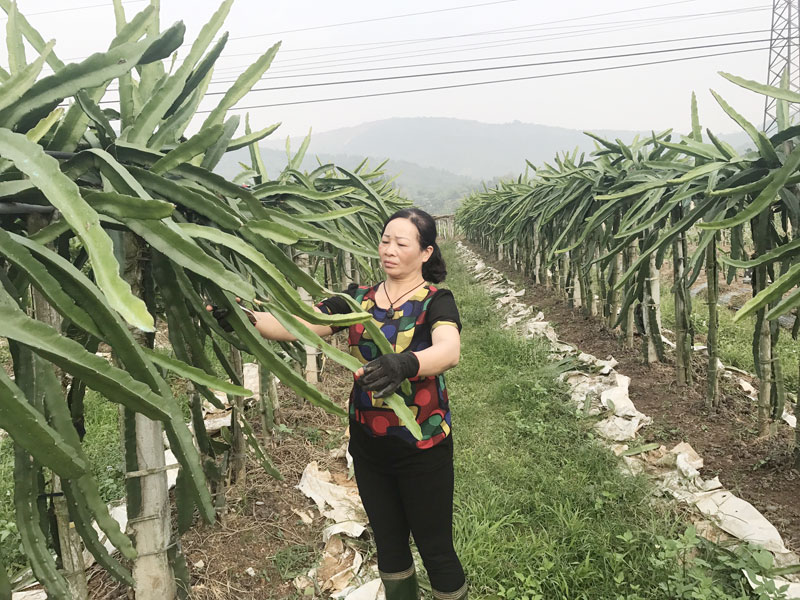
(HBO) - There have been 659 members in the Farmers’ Association of Hop Thanh commune currently. They are living and having meeting at 9 cells. In order to promote the emulation of good production and business, the Farmers’ Association has promoted the propaganda and mobilized people to increase the production, to intensify crops and to apply the science and technology into production to increase the productivity per unit of area.
 The general economic
model of Ms. Lu Thi Thu, Nha village, Hop Thanh commune (Ky Son) has brought
the income of 200-300 million VND a year.
The general economic
model of Ms. Lu Thi Thu, Nha village, Hop Thanh commune (Ky Son) has brought
the income of 200-300 million VND a year.
The Associations of all levels have always had meetings to
evaluate the actual situations of production, giving advises to take measures
and draw experience on time.
The farmers’ movement of the emulation of production, good
business and solidarity to help each other get richer has spread strongly and
widely throughout the locality. A lot of typical examples in production have
appeared, contributing to help the face of rural areas flourish.
Mr. Dinh Thi Nhung, the Chairman of Hop Thanh Farmers' Union
says that "The movement of good production and business” has aroused the will
of making it happen in business and life and overcoming the difficulties to get
rich of the farmers. Through the movement, the members have actively been
working, pushing up the restructuring of crops and livestock and boldly
applying science and technology into production to raise the income. In 2018,
there were 437 members registered to participate in the movement within the
whole commune. Through the review, there were over 90% of the members achieving
the title of farmers producing and doing business well”.
In order to support the members in production and business,
the Association has received a loan of more than 3.3 billion VND from the
District’s Social Policy Bank, 10 billion VND from Ky Son Bank for Agriculture
and Rural Development to help the members expand production and raise the income.
In 2018, the total output of the grain food reached 1,970.9 tons, accounting
for 103.7% of the plan. The total herd of cattle reached 1,184 buffaloes and
cows, 5,456 pigs, 38,500 poultry, 34 cages of fish and so on. The crops such as
rice, corn, cannaceae, vegetable trees and fruit trees all have gained high
productivity. The average food reached 551.3 kg a person a year. The average
income reached 31.3 million VND a person a year.
According to data from the Hoa Binh Provincial Party Committee, the industrial production index for the first six months of 2025 is estimated to have increased by 20% compared to the same period last year. This marks the highest year-on-year growth rate for this period since 2020.
In the first six months of 2025, Hoa Binh province’s export turnover was estimated at 1.145 billion USD, marking an 18.11% increase compared to the same period in 2024. Import turnover was estimated at $ 804 million, a 17.15% increase, which helped the province maintain a positive trade balance.
The lives of the ethnic minority farmers in Tan Lac district have gradually improved thanks to the new directions in agricultural production. This is a testament to the collective strength fostered through the professional associations and groups implemented by various levels of the district’s Farmers’ Union.
With the motto the "product quality comes first,” after nearly one year of establishment and operation, Muong village’s Clean Food Agricultural and Commercial Cooperative, located in Cau Hamlet, Hung Son Commune (Kim Boi district), has launched reputable, high-quality agricultural products to the market that are well-received by consumers. The products such as Muong village’s pork sausage, salt-cured chicken, and salt-cured pork hocks have gradually carved out a place in the market and they are on the path to obtaining the OCOP certification.
In the past, the phrase "bumper harvest, rock-bottom prices" was a familiar refrain for Vietnamese farmers engaged in fragmented, small-scale agriculture. But today, a new spirit is emerging across rural areas of Hoa Binh province - one of collaboration, organisation, and collective economic models that provide a stable foundation for production.
Maintaining growing area codes and packing facility codes in accordance with regulations is a mandatory requirement for agricultural products to be eligible for export. Recently, the Department of Agriculture and Environment of Hoa Binh province has intensified technical supervision of designated farming areas and packing facilities to safeguard the "green passport" that enables its products to access international markets.



 The general economic
model of Ms. Lu Thi Thu, Nha village, Hop Thanh commune (Ky Son) has brought
the income of 200-300 million VND a year.
The general economic
model of Ms. Lu Thi Thu, Nha village, Hop Thanh commune (Ky Son) has brought
the income of 200-300 million VND a year.